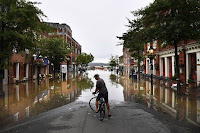The risk of a ratings downgrade can pressure cities and companies to take steps to mitigate climate risks, such as from sea level rise.
One of the main agencies that rates the creditworthiness of big borrowers, including cities and corporations, has brought on board a data firm specializing in climate risks. It's a signal that rating agencies are paying more attention to global warming and its impact in the financial markets.
Credit ratings, much like individual credit scores, assess how likely it is that a borrower will repay debt. Those ratings can affect how much governments and companies are able to borrow and how much it will cost them. Just the threat of a lower credit rating can pressure cities and companies to be more proactive in taking steps to mitigate risks, and now those risks are starting to include climate change.
"More and more, issuers and investors want to know how they are exposed to climate events," said Michael Mulvagh, head of communications in the Americas, Europe, Africa and the Middle East for Moody's Corporation, which owns one of the largest U.S. ratings agencies.
Read more at Climate Change Becomes an Issue for Ratings Agencies

No comments:
Post a Comment